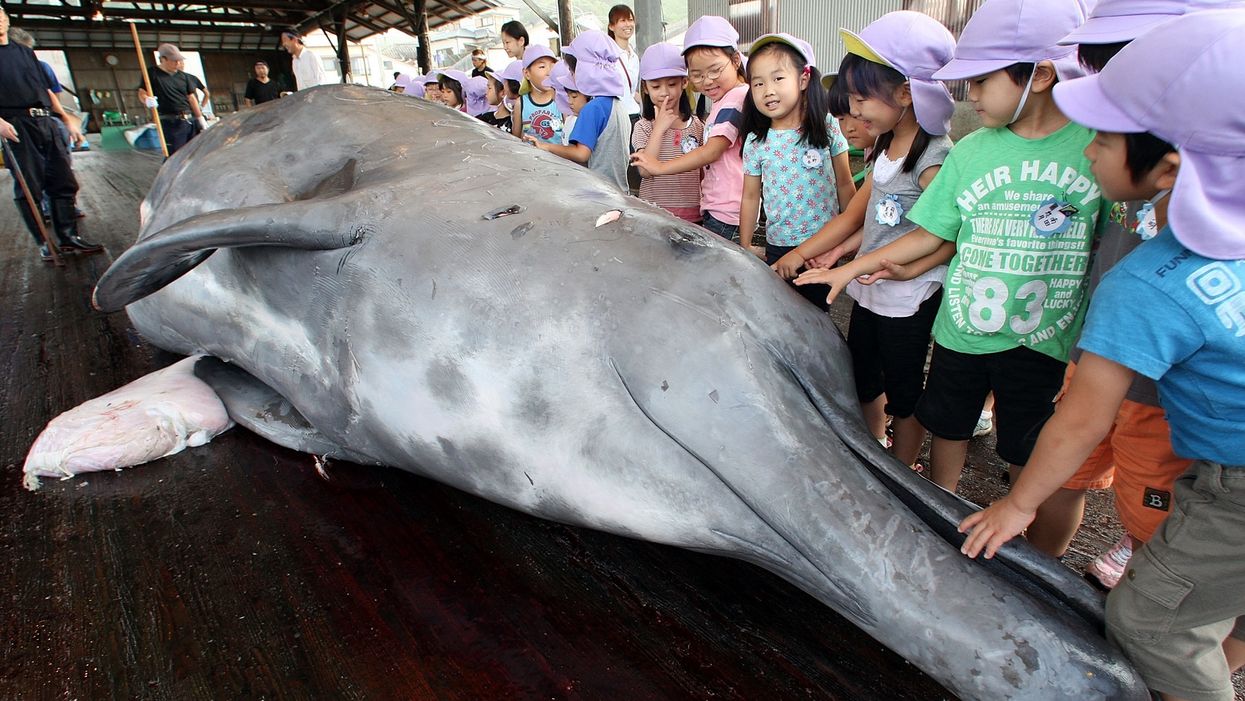
Junko Kimura/Getty Images

Country says it's leaving the International Whaling Commission after 67 years of membership
Citing its cultural heritage, Japan's government announced Wednesday that the country would resume commercial whaling in July following an official decades-long reprieve from the practice.
The country also intends to scrap its membership with the International Whaling Commission after 67 years, shocking other nations and drawing ire from environmentalists.
Critics say Japan has never really stopped commercial whaling, in spite of its agreement to the IWC's moratorium on whale hunting dating back to 1986. According to the New York Times, the international agreement allowed Japan to kill a certain quota of whales in Antarctic for "scientific research" purposes; but that loophole is considered to be a ruse — whale meat restaurants operate in the country in spite of reportedly declining demand, and byproducts are sold in its stores.
According to the Animal Welfare Institute, whaling has been a part of Japanese culture for centuries — possibly dating as far back as the Jomon period (14,500-300 BC).
The island nation's chief cabinet secretary, Yoshihide Suga, said in a statement Wednesday: "In its long history, Japan has used whales not only as a source of protein but also for a variety of other purposes. Engagement in whaling has been supporting local communities, and thereby developed the life and culture of using whales."
Suga explained that Japan was dropping its IWC membership because the organization failed to develop guidelines for a sustainable whaling industry — part of its stated mission — instead focusing primarily on conservation efforts. Despite leaving the IWC, Japan will still send representatives to IWC meetings.
An official from the foreign ministry's fisheries division told Reuters, "It's not like we are turning our back on the IWC and abandoning international cooperation. There is no change to our country's respect for the rule of law and multiculturalism."
Japan's commercial whaling will be within its own territorial waters, according to Suga. The hunting begins in July 2019.
Sam Annesley, executive director at Greenpeace Japan, said in a statement:
It's clear that the government is trying to sneak in this announcement at the end of the year, away from the spotlight of international media, but the world sees this for what it is. The declaration today is out of step with the international community, let alone the protection needed to safeguard the future of our oceans and these majestic creatures. The government of Japan must urgently act to conserve marine ecosystems rather than resume commercial whaling.
As a result of modern fleet technology, overfishing in both Japanese coastal waters and high seas areas has led to the depletion of many whale species. Most whale populations have not yet been recovered, including larger whales such as blue whales, fin whales and sei whales.
The world's oceans face multiple threats such as acidification and plastic pollution, in addition to overfishing. As a country surrounded by oceans where people's lives have been heavily reliant on marine resources, it is essential for Japan to work towards healthy oceans. Japan's government has far failed to resolve these problems.
U.K. Health Secretary Michael Grove tweeted about his disappointment in Japan's decision:
Extremely disappointed to hear that Japan has decided to withdraw from the International Whaling Commission to resume commercial whaling. The UK is strongly opposed to commercial whaling and will continue to fight for the protection and welfare of these majestic mammals.
— Michael Gove (@michaelgove) December 26, 2018
The head of campaigns of the Humane Society in Australia, Nicola Beynon, accused Japan of "operating completely outside the bounds of international law," and said, "This is the path of a pirate whaling nation, with a troubling disregard for international rule," the BBC reported.
Japan isn't the only country who has pushed back against the IWC. According to the BBC, a group of pro-whaling nations (Faroe Islands, Greenland, Iceland and Norway) formed an alternative organization, Nammco. Under U.N. regulations, Japan must be a part of some international organization for the conservation and study of whales; but they can choose which organization that is, meaning they can either join another group or form their own.
Activists fear that other countries whose citizens have a palate for whale meat might follow Japan's lead.